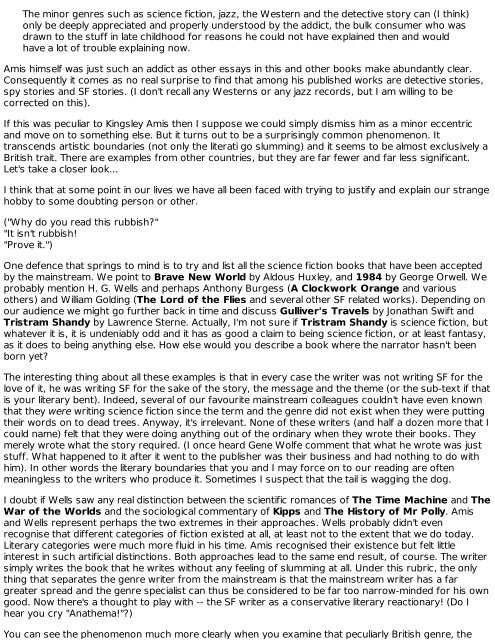Triffids Beard 2 - The Bearded Triffid
Triffids Beard 2 - The Bearded Triffid
Triffids Beard 2 - The Bearded Triffid
You also want an ePaper? Increase the reach of your titles
YUMPU automatically turns print PDFs into web optimized ePapers that Google loves.
<strong>The</strong> minor genres such as science fiction, jazz, the Western and the detective story can (I think)<br />
only be deeply appreciated and properly understood by the addict, the bulk consumer who was<br />
drawn to the stuff in late childhood for reasons he could not have explained then and would<br />
have a lot of trouble explaining now.<br />
Amis himself was just such an addict as other essays in this and other books make abundantly clear.<br />
Consequently it comes as no real surprise to find that among his published works are detective stories,<br />
spy stories and SF stories. (I don't recall any Westerns or any jazz records, but I am willing to be<br />
corrected on this).<br />
If this was peculiar to Kingsley Amis then I suppose we could simply dismiss him as a minor eccentric<br />
and move on to something else. But it turns out to be a surprisingly common phenomenon. It<br />
transcends artistic boundaries (not only the literati go slumming) and it seems to be almost exclusively a<br />
British trait. <strong>The</strong>re are examples from other countries, but they are far fewer and far less significant.<br />
Let's take a closer look...<br />
I think that at some point in our lives we have all been faced with trying to justify and explain our strange<br />
hobby to some doubting person or other.<br />
("Why do you read this rubbish?"<br />
"It isn't rubbish!<br />
"Prove it.")<br />
One defence that springs to mind is to try and list all the science fiction books that have been accepted<br />
by the mainstream. We point to Brave New World by Aldous Huxley, and 1984 by George Orwell. We<br />
probably mention H. G. Wells and perhaps Anthony Burgess (A Clockwork Orange and various<br />
others) and William Golding (<strong>The</strong> Lord of the Flies and several other SF related works). Depending on<br />
our audience we might go further back in time and discuss Gulliver's Travels by Jonathan Swift and<br />
Tristram Shandy by Lawrence Sterne. Actually, I'm not sure if Tristram Shandy is science fiction, but<br />
whatever it is, it is undeniably odd and it has as good a claim to being science fiction, or at least fantasy,<br />
as it does to being anything else. How else would you describe a book where the narrator hasn't been<br />
born yet?<br />
<strong>The</strong> interesting thing about all these examples is that in every case the writer was not writing SF for the<br />
love of it, he was writing SF for the sake of the story, the message and the theme (or the sub-text if that<br />
is your literary bent). Indeed, several of our favourite mainstream colleagues couldn't have even known<br />
that they were writing science fiction since the term and the genre did not exist when they were putting<br />
their words on to dead trees. Anyway, it's irrelevant. None of these writers (and half a dozen more that I<br />
could name) felt that they were doing anything out of the ordinary when they wrote their books. <strong>The</strong>y<br />
merely wrote what the story required. (I once heard Gene Wolfe comment that what he wrote was just<br />
stuff. What happened to it after it went to the publisher was their business and had nothing to do with<br />
him). In other words the literary boundaries that you and I may force on to our reading are often<br />
meaningless to the writers who produce it. Sometimes I suspect that the tail is wagging the dog.<br />
I doubt if Wells saw any real distinction between the scientific romances of <strong>The</strong> Time Machine and <strong>The</strong><br />
War of the Worlds and the sociological commentary of Kipps and <strong>The</strong> History of Mr Polly. Amis<br />
and Wells represent perhaps the two extremes in their approaches. Wells probably didn't even<br />
recognise that different categories of fiction existed at all, at least not to the extent that we do today.<br />
Literary categories were much more fluid in his time. Amis recognised their existence but felt little<br />
interest in such artificial distinctions. Both approaches lead to the same end result, of course. <strong>The</strong> writer<br />
simply writes the book that he writes without any feeling of slumming at all. Under this rubric, the only<br />
thing that separates the genre writer from the mainstream is that the mainstream writer has a far<br />
greater spread and the genre specialist can thus be considered to be far too narrow-minded for his own<br />
good. Now there's a thought to play with -- the SF writer as a conservative literary reactionary! (Do I<br />
hear you cry "Anathema!"?)<br />
You can see the phenomenon much more clearly when you examine that peculiarly British genre, the


